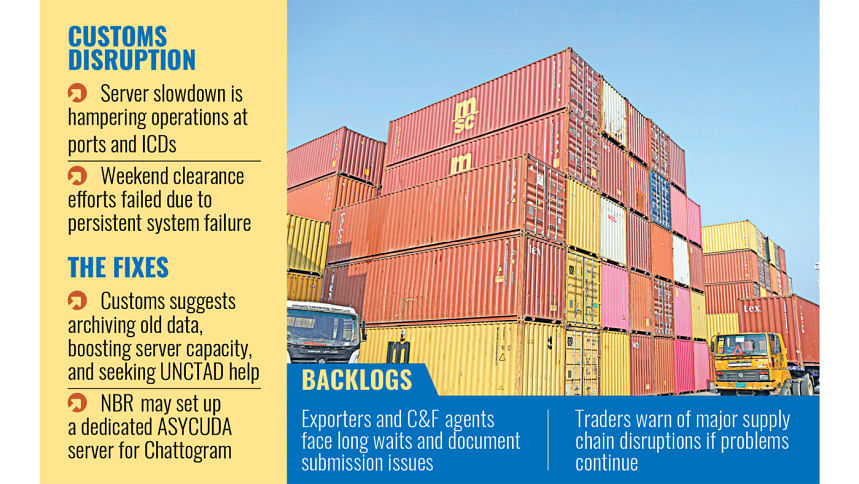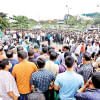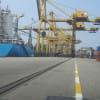NBR server glitch disrupts port, customs operations

Major customs houses across Bangladesh, including that in Chattogram, have been facing delays in processing exports and imports for days now due to recurring slowdowns in the server that handles the records.
This has led to apprehensions of a pileup of cargo and processing backlogs at ports and inland container depots.
The customs houses use ASYCUDA World, an automated system for customs data processing, which was introduced in 2013, replacing the earlier ASYCUDA++ version.
While the system is designed to handle end-to-end online submissions, performance lags and breakdowns have become increasingly frequent.
According to customs officials, the system now functions for only 10 to 15 minutes every two hours, causing serious delays in the clearance procedures of import and export consignments.
On Thursday, the National Board of Revenue (NBR) issued a directive keeping customs houses—including those in Chattogram, Benapole, Mongla, and Dhaka—in operation over the weekend on July 11 and July 12 to mitigate the backlog.
However, this had little benefit, as clearances could not proceed due to the system's limited functionality.
On the other hand, relevant entities, such as banks and offices of shipping agents, were closed over the weekend.
Clearance of export and import consignments did not go smoothly on those two days due to the server slowdowns, confirmed the clearing and forwarding (C&F) agents.
The slowdown's ripple effect has been felt at the Chattogram port and the private inland container depots (ICDs).
Import and export containers have started accumulating, and long queues are forming at the entrances of ICDs with trucks carrying export cargo, causing disruptions and delays in operations.
Stakeholders warn that continued delays may trigger widespread disruptions to supply chains.
The Chattogram port and the ICDs are yet to clear an acute backlog created during the long Eid-ul-Azha vacation and a two-day work abstention by demonstrating NBR officials last month.
The server slowdowns, which turned acute since July 1, have worsened the situation.
Official data show that the port's yards had 44,246 twenty-foot equivalent units (TEUs) of containers as of yesterday morning, taking up nearly 83 percent of the space dedicated for the purpose.
Berth operators said they were finding it difficult to work amidst the space limitations.
A vessel named Maersk Jakarta set off from the port on Saturday leaving behind over 100 TEUs of export containers.
Another vessel, Maersk Nusantara, postponed its departure yesterday as the containers it was scheduled to pick up could not be sent from the private ICDs in time.
The ICD operators said they were facing delays in transporting export containers to the port as most of the 21 private ICDs were jam-packed.
The number of export containers at the ICDs reached 14,512 TEUs yesterday, while it usually hovers near 8,000 TEUs.
Two covered vans carrying export products from Far East Knitwear and Dyeing Industries Limited, a readymade garment factory in Gazipur, reached outside a private ICD named Incontrade Limited on Friday morning.
Kamruzzaman Sagar, proprietor of the C&F firm facilitating the trade, said yesterday that the vehicles were still waiting outside.
They had failed to submit export documents through the server over the past three days to get the "bill of export" number, which is actually a 10-minute job, he said.
A bill of export, also known as a shipping bill in some contexts, is a crucial document in international trade that allows for the export of goods from a country.
"Facing the slow server in our office computers on Friday, our staff tried to get the job done using computers of the support section of the C&F Agents' Association till Saturday night but failed," he said.
"I personally went to Custom House, Chattogram today and sought help from the customs officials but nothing happened," said the frustrated C&F agent.
On Saturday, Custom House, Chattogram submitted a set of urgent proposals aimed at resolving the critical slowdown in the ASYCUDA World system.
In the report, it admitted that the server slowdown has hampered import-export assessments since July 1.
The report also said the glitch has significantly delayed cargo clearance, raising concerns about potential congestion at the port and inland depots.
In the report, Custom House, Chattogram Acting Commissioner Shafi Uddin provided a three-point recommendation to the NBR's IT team.
They were: archiving data older than five years to reduce server load, enhancing server capacity based on the number of active users, and resolving the ongoing issues by seeking technical support from the system's operator—the ASYCUDA team under the United Nations Conference on Trade and Development (UNCTAD).
Despite repeated attempts, Golam Sarwar, the programmer currently in charge of the server's management under the National Board of Revenue (NBR), could not be reached over the phone.
However, speaking on condition of anonymity, a senior member of the NBR's IT team said, "Technical support for the ASYCUDA server is provided by UNCTAD."
"The primary server is installed at the old NBR headquarters in Dhaka, while a backup server is located at the Dhaka Customs House," said the official.
He added that nearly 80 percent of total users of the ASYCUDA World system were officials and C&F agents operating under the Chattogram Customs House.
"Therefore, to ensure uninterrupted service, it would be prudent to consider setting up a dedicated server exclusively for the Chattogram Customs House," he said.
He said the NBR was considering multiple possible solutions and expressed hope that the issue would be resolved soon.
On average, the customs house handles around 3,500 to 4,000 bills of entry per day. When the system goes down, even the simplest clearance takes up to five times longer than usual, traders complain.


 For all latest news, follow The Daily Star's Google News channel.
For all latest news, follow The Daily Star's Google News channel. 








Comments